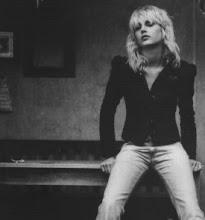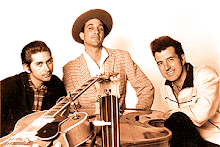 It is said at the time of her passing, in 1972, that Mahalia Jackson- the world's greatest gospel singer- had a larger white following than a black fan base. Whether or not this is true, she is revered the world over for her perfect sound in the jazz and blues based gospel she practically reinvented. Aretha Franklin, the Queen of Soul, was known to have said that Mahalia was her favorite singer. She won three Grammy Awards, one posthumously, with Best Gospel Recording in 1961 for Every Time I Feel the Spirit and the next year for Great Songs of Love and Faith. Her posthumous Grammy came in 1976- four years after her death- for How I Got Over in the category of Gospel Soul Performance. This woman who redefined gospel for musical geniuses like Ramsey Lewis Jr. started out life in New Orleans. She was born on October 26, 1911 and was raised singing in church at Mount Moriah Baptist. Her religious training, both biblical and musical, was strict which means that the training was in hymns and spiritual music which did not carry over into Jazz or Blues. However, one can imagine that she was exposed to those genres and the singers which would have influenced her were most likely Ma Rainey and Bessie Smith. Those singers were probably important influences on her very early in life. By the time her career was well underway she had injected jazz and blues into the passionate spiritual in a way that had never before been achieved. In 1927, at the age of sixteen, she moved to Chicago and worked as a maid and then a nurse, but her love of gospel kept her at her true vocation. Even though Mahalia never sang secular music she was definitely influenced by the black secular music sound which helped her redefine gospel music in Chicago at the time. In 1935, after singing at a funeral, Decca Records talent scouts approached her about recording for them. Her records sold well and by 1937 she moved onto other independent recording labels one of them being Apollo Records. It was a natural progression of success which brought her to association with Thomas Dorsey, whom she recorded and toured with extensively. Their association eventually brought them both international acclaim. Her recording of the song, "I will move on up a little higher", sold more than two million copies. This particular song was one she would extend into as much as twenty-five minutes when singing live ! The recording available today is long at five minutes and 25 seconds. After being recognized in France for her recording excellence she made her first European tour in 1952 and two years later signed with Columbia where she made about thirteen more LPs. These recordings were made with Mitch Miller who used strings and choirs to back her and sold world-wide. This is unprecedented success considering that Mahalia's ambition was never cast outside her sacred music debut. In the beginning, her sound was perceived as rebellious by the more conservative black churches- even the one she grew up singing in. However, her long-time accompanist, Mildred Falls, most likely kept her to a standard which didn't restrict her musicianship and was a support to her early convictions as a gospel singer. One record executive, John Hammond, stated that Mildred was also, "the greatest gospel accompanist that ever lived." Later she appeared in films like Nat King Cole's St. Louis Blues, a big-budget melodrama Imitation of Life and a performance jazz documentary Jazz on a Summer's Day. Even though she was strictly gospel she did share the stage with such jazz greats as Louis Armstrong and Duke Ellington, eventually helping Ellington record his own sacred music. There is no question that she set the standard that gospel music thrives on today regardless of the racial issue. She helped jazz cross color lines and brought sacred music to an emotional level which has never been achieved in any other genre of music. She once said, "If you don't like it, you're not human." By the 1960s she led the way toward advancing education for the black community and became a businesswoman with a chain of restaurants. She was a strong supporter of the civil rights movement including backing Dr. Martin Luther King, Jr. She sang an unforgettable version of Thomas Dorsey's "Take My Hand, Precious Lord" at King's funeral and surprisingly enough, Aretha Franklin sang this very song at Mahalia's own funeral after her passing on January 27, 1972. The first recorded song I heard of Mahalia's was Joshua Fit the Battle of Jericho, an upbeat jazz version which showed off a part of her stylistic range. Below is a recommended song list derived from the Columbia CD collection titled, Gospels, Spirituals, and Hymns. It came out in 1991 and I would suggest to start there, if you are not acquainted with her music. If you ever find a live recording of her 1951 performance at Carnegie Hall give me a call. Many pop singers today do over-the-top versions of a true technique employed by Mahalia across genre spectrums. Once you hear her voice you'll know that these were not mere vocal stylings but a truly inspired voice full of passion, sincerity and worship. All else is often just a copy of the original which does not understand the love that propelled her sound and not just of the music but the creator who inspired it all to begin with- our Lord and Savior, Jesus Christ.
It is said at the time of her passing, in 1972, that Mahalia Jackson- the world's greatest gospel singer- had a larger white following than a black fan base. Whether or not this is true, she is revered the world over for her perfect sound in the jazz and blues based gospel she practically reinvented. Aretha Franklin, the Queen of Soul, was known to have said that Mahalia was her favorite singer. She won three Grammy Awards, one posthumously, with Best Gospel Recording in 1961 for Every Time I Feel the Spirit and the next year for Great Songs of Love and Faith. Her posthumous Grammy came in 1976- four years after her death- for How I Got Over in the category of Gospel Soul Performance. This woman who redefined gospel for musical geniuses like Ramsey Lewis Jr. started out life in New Orleans. She was born on October 26, 1911 and was raised singing in church at Mount Moriah Baptist. Her religious training, both biblical and musical, was strict which means that the training was in hymns and spiritual music which did not carry over into Jazz or Blues. However, one can imagine that she was exposed to those genres and the singers which would have influenced her were most likely Ma Rainey and Bessie Smith. Those singers were probably important influences on her very early in life. By the time her career was well underway she had injected jazz and blues into the passionate spiritual in a way that had never before been achieved. In 1927, at the age of sixteen, she moved to Chicago and worked as a maid and then a nurse, but her love of gospel kept her at her true vocation. Even though Mahalia never sang secular music she was definitely influenced by the black secular music sound which helped her redefine gospel music in Chicago at the time. In 1935, after singing at a funeral, Decca Records talent scouts approached her about recording for them. Her records sold well and by 1937 she moved onto other independent recording labels one of them being Apollo Records. It was a natural progression of success which brought her to association with Thomas Dorsey, whom she recorded and toured with extensively. Their association eventually brought them both international acclaim. Her recording of the song, "I will move on up a little higher", sold more than two million copies. This particular song was one she would extend into as much as twenty-five minutes when singing live ! The recording available today is long at five minutes and 25 seconds. After being recognized in France for her recording excellence she made her first European tour in 1952 and two years later signed with Columbia where she made about thirteen more LPs. These recordings were made with Mitch Miller who used strings and choirs to back her and sold world-wide. This is unprecedented success considering that Mahalia's ambition was never cast outside her sacred music debut. In the beginning, her sound was perceived as rebellious by the more conservative black churches- even the one she grew up singing in. However, her long-time accompanist, Mildred Falls, most likely kept her to a standard which didn't restrict her musicianship and was a support to her early convictions as a gospel singer. One record executive, John Hammond, stated that Mildred was also, "the greatest gospel accompanist that ever lived." Later she appeared in films like Nat King Cole's St. Louis Blues, a big-budget melodrama Imitation of Life and a performance jazz documentary Jazz on a Summer's Day. Even though she was strictly gospel she did share the stage with such jazz greats as Louis Armstrong and Duke Ellington, eventually helping Ellington record his own sacred music. There is no question that she set the standard that gospel music thrives on today regardless of the racial issue. She helped jazz cross color lines and brought sacred music to an emotional level which has never been achieved in any other genre of music. She once said, "If you don't like it, you're not human." By the 1960s she led the way toward advancing education for the black community and became a businesswoman with a chain of restaurants. She was a strong supporter of the civil rights movement including backing Dr. Martin Luther King, Jr. She sang an unforgettable version of Thomas Dorsey's "Take My Hand, Precious Lord" at King's funeral and surprisingly enough, Aretha Franklin sang this very song at Mahalia's own funeral after her passing on January 27, 1972. The first recorded song I heard of Mahalia's was Joshua Fit the Battle of Jericho, an upbeat jazz version which showed off a part of her stylistic range. Below is a recommended song list derived from the Columbia CD collection titled, Gospels, Spirituals, and Hymns. It came out in 1991 and I would suggest to start there, if you are not acquainted with her music. If you ever find a live recording of her 1951 performance at Carnegie Hall give me a call. Many pop singers today do over-the-top versions of a true technique employed by Mahalia across genre spectrums. Once you hear her voice you'll know that these were not mere vocal stylings but a truly inspired voice full of passion, sincerity and worship. All else is often just a copy of the original which does not understand the love that propelled her sound and not just of the music but the creator who inspired it all to begin with- our Lord and Savior, Jesus Christ. Ain't nothing like the real thing baby...
All rights reserved by author, Evelyn M. Wallace (May not be reproduced in whole or in part without written permission by author.)
The Castle Lady
Discography (in part)
My God is Real August 11, 1958
If I Can Help Somebody September 24, 1963
What a Friend We Have in Jesus August 2 & 3, 1965
You Must Be Born Again November 17, 1959
Elijah Rock (Stockholm, Sweden) April 18, 1961 (Live)
Roll, Jordan, Roll April 5, 1968
Calvary (New York) March 26, 1967
Trouble of the World
from the film Imitation Of Life N.Y. March 27, 1956
Take My Hand, Precious Lord (T.A. Dorsey) N.Y. March 27, 1956
He's Got the Whole World in His Hands
(Newport Jazz Festival w/ Mildred Falls Trio) July 7, 1958
Nobody Knows the Trouble I've Seen
(Hollywood March 12, 1963)
I'm Going to Live the Life I Sing about in My Song
Newport Jazz Festival August 11, 1958
Search Me Lord (Hollywood) January 31, 1969






































